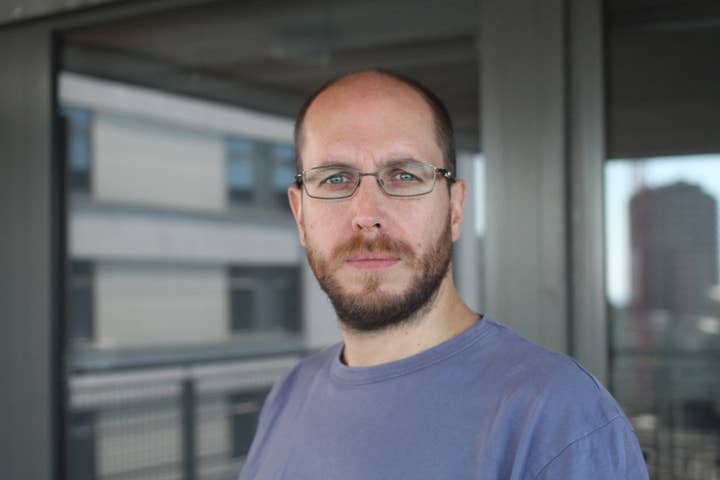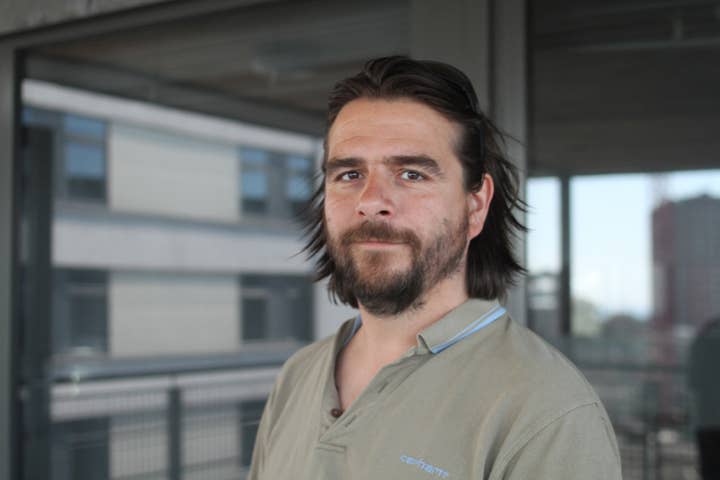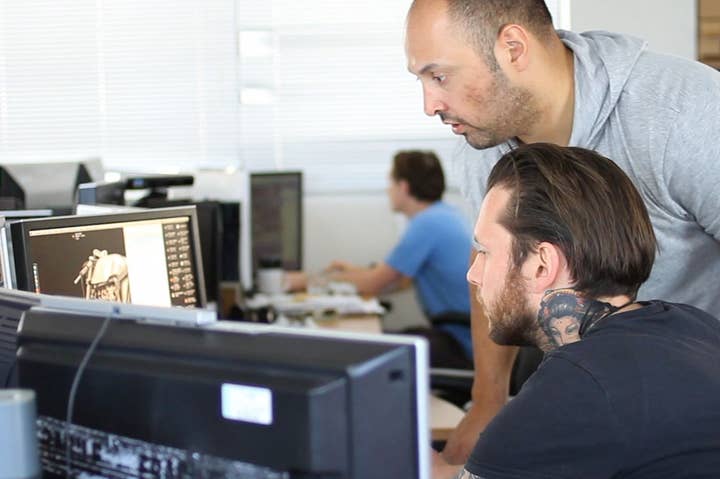Staying Alive: How Kuju is Thriving on Work for Hire
The studio celebrates 15 years with two next-gen games in the works
Things are looking up again, which is a nice thing to be able to say. It's been a gruelling and uncertain few years but, with new consoles on the horizon and the mobile gold rush settling into slightly more predictable patterns those studios which have survived the turmoil are finding their feet again.
There aren't many arenas where it's been tougher than the mid-range work for hire studios. They've been hit by the knock on effect of shrinking catalogues and budgets from clients, largely shut out of the growth areas of social, mobile and free-to-play and have had to scrabble to find work elsewhere. Many have buckled under the pressure, shedding staff or closing their doors forever.
For those who have survived, there's definitely light on the horizon. With two Xbox One projects in the works as it celebrates its fifteenth birthday, Kuju has knuckled down long enough to reap the rewards. GamesIndustry International caught up with senior staff at the Brighton studio to discover what's kept the outfit strong.
"Obviously Kuju has been in the same place as a lot of other developers for the past few years," studio head Paul Mottram explains. "It's been difficult, especially if you've been independent. Kuju has always had a history of weathering and surviving these storms - although we've seen things like Vatra, which was our Czech studio, shut down. The focus has been to stay with Headstrong and ourselves, who've been successful over the last few years, and Testronic, which is expanding rapidly."
Kuju might not be a name which is on the lips of the CoD and FIFA obsessed 'core' audience, but more people than you might think have enjoyed a game which has the studio's touch.
"As a studio we've never dismissed a genre because it's not cool. Different audiences want different experiences"
Paul Mottram, studio head
"We've been lucky as a studio because we've picked up some successful franchises which have brought some continued work," Mottram continues. "That's allowed us to do our own little things like Chime and Crush. We've also done Singstar, Guitar Hero stuff, Zumba. These are all games that have been successful which have been overlooked by the core gaming press. As a studio we've never dismissed a genre because it's not cool. Different audiences want different experiences."
Art Director Ben Hebb sees those internal projects, relatively minor though they may be, as absolutely vital to the continued health and enthusiasm of the team. And, with Powerstar Golf set to be the studio's first Xbox One title, he sees the possibilities as ever-expanding.
"As a business we've done the big franchises," he tells me. "We've given everything and cared creatively about those. However, doing things like Crush and Chime and Powerstar Golf really mean something to people here, not just from a business point of view. Actually, Golf has now grown into quite a big game and the profile it'll get as a launch title is massive for us.
"This is the game that Paul's always wanted to make. There's a passion and excitement about it. Because it's going to be bigger, the confidence it gives to people in the studio about coming forward with new ideas is massive. Some people think that Zoe Mode just don't make certain types of games - we get that internally as well as from the outside, but actually that's beginning to change - people are coming forward with ideas, it's a momentum shift."
So far, Kuju has played quite safe with business models and funding, steering clear of free-to-play and Kickstarter in favour of reliable income and boxed product. Powerstar Golf will be a digital game, so I ask if there's any room to look at another angle for the business.

"We still make console games - that's our primary focus," Mottram tells me. "We've talked about business models and things like free to play: platform holders are talking about that, too. Whilst everyone was jumping onto mobile or free-to-play, we always felt that there was always going to be a big console market and that perhaps when everyone else is fleeing is the time that you should stay. That's when the opportunities arise. It's way too easy to jump on the latest platform."
Given that some of the studio's biggest earners have been games like Zumba, which continues but seems unlikely to become a long-running genre staple, I'm a bit nonplussed by Mottram's ideas about sticking to what you know. Surely, as a long-running work for hire group, they've covered more new ground than most, shifting from project to project as the contracts demand?
"I think the genres of games of we work in aren't specialised, but the audience we target with them is," he explains. "We're not targeting 'core' gamers. The audience we've historically sold to has been big, mass market - they've moved around, so we've moved with them. They were singing at one stage, then playing Guitar Hero, then they were doing Zumba. So we've moved with our target audience, rather than diversifying. We know how to to make games which are very accessible to people who aren't core gamers, from the interfaces we use to the rewards. That's been the same. The genre might change but the ethos doesn't."
"The feedback that we've had from publishers is that we can take a licence and spin it the right way," adds Hebb, "add some creative interest rather than just create another 'me too'. I think that's what we challenge the teams with here: we don't want to just create another copycat or reiterate what we've just done before. It is what it is, but let's enjoy it and make as great a game out of it if we can. It could be singing, dancing or golf, but you have to make a great game out of it. You have to challenge each other. It's what we tell our teams, but it's also what we hear back from other people - what they like about what we do. We always try to add some innovation.
"There's a gameplay side to that, but speaking from an artist's background, there's also always new things to try there, new techniques, always something to learn. That way our staff are learning, they're getting better as well as making better games. It keeps people interested, too. People's mentality gets better, the work gets better and the games get better."
"It keeps people interested, too. People's mentality gets better, the work gets better and the games get better"
Head artist Ben Hebb on work for hire
Mottram admits that they've backed some short-lived horses in the past, but they've always been ready to move on before things have become dire.
"If we'd, at any stage, said we were just going to stick with a single genre, we'd be out of business," he says, matter-of-factly. "Things like Guitar Hero were huge for a certain period of time, but now it's vanished. If you're going to specialise in one of those genres which only 1 per cent of developers have the budget for, then yeah, you need to be the people who've made that game 20 times, but we have the freedom to change what we're doing, which keeps the team fresh, inspired."
"Zoe is very much considered to be a studio of experts in that field of 'pop' games," adds ebullient veteran Gary Bracey, who joined as commercial director in June, 2012. "When the markets are ready, when the new consoles have had the time to become truly mass-market, there'll be that audience and those games will come back."
Whilst Kuju has worked with a vast range of publishers and platform holders over the years, I'm a little surprised at their enthusiasm for being under the wing of Microsoft for their next two projects. Given the bad press that the corporation's developer relations has had recently, have there been any difficulties in the process?

"Microsoft is a big company, there's a lot going on," says Mottram. "I think they're probably very similar to Sony, really, and we've worked with Sony as well. They want to make the benchmark titles for their platform, to make them as good as can be and to showcase the features of that machine. That's the most important thing you can do if you're doing something first-party, you need to show the third-parties how to do it. But I think our relationship with Microsoft is one of the best we've had with any publisher before.
"We work directly with the team over in Redmond and the level of communication between teams is really really good."
"It's definitely a collaboration, too," Hebb enthuses. "There's a genuine passion - that's how it feels, it's not an 'us and them' thing, it's a shared goal of making a great game. They're coming at it exactly the same way as we are. It's collaborative and supportive. They are as willing to get involved as any member of the team here."
"What we've found with Microsoft is that, if there's something that we feel very strongly would be good for the game, they're very acknowledging of that," says Mottram, picking up the thread again. "But they also bring resources to help - they've got artists, coders, designers that they can bring onto the job. That can be really helpful. We're trying to get the most out of the console, so they've got tech guys to help us do that, art guys to supplement the team. That's great - that's exactly what you need from a publisher. You don't want a publisher who sits back and refuses to help. They're willing to do whatever it takes to help."
"I was sitting in the production core last week, they were chatting to Microsoft," Bracey interjects. "They had a coder there that everyone knew and they said, 'he's yours, whenever you want to use him.' I've never heard that before, particularly working with publishers rather than platform holders. But like everyone they do want to squeeze as much as possible out of you, there's feature creep and things like that, but that's the same with everyone. They want to maximise the value of their money."
"With any game, you have to realise that someone is paying you to make it. If a publisher is paying you, they're your client - they have to have a voice"
Paul Mottram
That bottom line is likely more evident and admissible at a contracted studio than any where else, I posture. Not only is your reputation and, by extension, your livelihood reliant on meeting that external deadline on budget and at quality, the creative process itself is by necessity more complex, with every change needing approval.
"With any game, you have to realise that someone is paying you to make it," Mottram points out. "If a publisher is paying you, they're your client - they have to have a voice. A developer who takes someone's money then says 'you can't have any input', is going to struggle to find an employer."
"A lot of the people we're dealing with have made a lot of games," Hebb continues. "They're not just suits, they make games, they have the same experiences we do, there's no blocks or bizarre vocabulary. They know exactly where we are, they just happen to be a platform holder and a publisher. There are no walls, no barriers. They get where we are and what we have to do - no hurdles, no hoops to jump through."
One place where Microsoft held a definite advantage in the last generation was in ease of development. Sony's Cell processor may have been ambitious and powerful, but the 360 was a lot easier to develop for, giving many cross-platform titles an all-important edge on the machine. Is the One going to share that edge?
"Well it's a launch console," says Mottram with a smile. "We've worked on a few of them - you get problems with any launch console. Both Sony and Microsoft have gone for PC architecture, which makes it essentially easier than previous consoles to get stuff up and running. If you can get it running on PC, you can get it running on Xbox One really easily.
"One of the really good things about working with Microsoft is that they're software developers, so all their tools work really well. They've made a conscious effort to simplify things for developers in terms of getting things working - certification is much easier, too. They're doing their best to make it easier to make games for it.
"They've had to make some changes but I think some of that stuff was forced on them by people on the internet. It shows that they're listening, whether those changes were the right thing to do. You don't want to end up where no one is willing to take a risk, because you end up with all consoles being the same. They're thinking of a very long term plan, I think. A lot of the stuff that they're worrying about won't be a problem in a few years."

